#but a deeply personal and internal one in which she makes the choice to change for herself
Explore tagged Tumblr posts
Text
"Weeeh! I wanna recruit Minthara on a good playthrough! Weeeh! I don't like the ultimatum and want to keep both Minthara and Halsin! Weeeh! I wanna make Minthara good! Weeeh! I don't want Minthara to break up with me!" Minthara deserves more content but none of these things are at all what she needs or deserves. No, these are all things that you want for yourself, but do absolutely nothing for her. This is one of the biggest L's in the game and it will forever enrage me because I just know it will never happen.
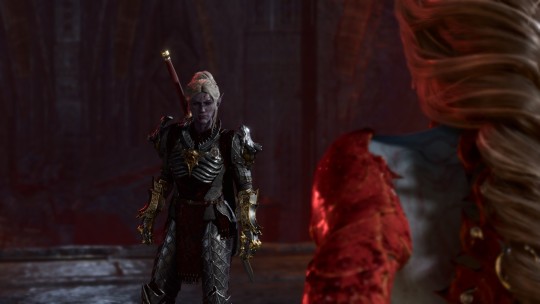
Minthara deserves to confront Orin like all the other companions do with their abusers. She deserves to scream and yell at Orin. She deserves to cut at her the same way Orin did, make her bleed and scream in pain. Minthara deserves to torture Orin, just as she did her in the mind flayer colony. Minthara deserves the right to roll up to the Temple of Bhaal and beat the shit out of Orin with her bare hands. Leave Orin begging for mercy in which Minthara will not even give her a drop. To slam Orin down on that altar and slice her throat, offer her up as a sacrifice to the father she is so blindly devoted to.
And yes, Minthara would be afraid. She would be TERRIFIED. Despite how strong and powerful Minthara is, she is also the only one afraid of Orin. Unlike Ketheric, or Gortash, or Sarevok, she is the only one who fully acknowledges just how dangerous Orin actually is and does not underestimate her. She will walk down into that temple, intending to duel Orin with a massive disadvantage because she is terrified.
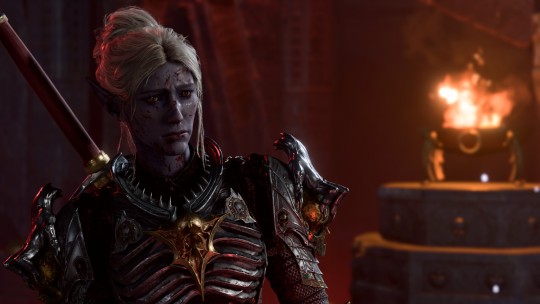
Minthara choked when seeing Orin again in the mind flayer colony. She choked when seeing Orin as an imposter, throwing her deep into the ocean of paranoia and fear. And she is so entrenched in paranoia that it actually becomes palpable to everyone around her, even you. She describes herself as paranoid, but this is the first that you actually see how paranoid she is. And she choked again when Orin kidnapped someone in camp, making her feel inadequate, making a mockery of her for being unable to protect one of her own. And every day that passes, the more and more likely that the victim is going to die and she has doubts on their survival.
At every possible avenue in which Minthara could have done something or said something about Orin, she froze in place with fear. But she's had enough. She cannot be afraid of Orin forever and she doesn't want to be. One way or another, Orin has to die and she wants to get over that fear. She needs to know that Orin is dead, for herself.
This would also make the alurlssrin confession all the more impactful. She wants to tell you that she loves you in the best way that she can because of the very high likelihood that she will never have another chance to do so. She would beg you to come with her as you give her the courage. She has the courage to face her fears and confront her tormentor, because she knows she has you in her corner. If you have the courage to stand up to the very gods themselves, then she can stand up to Orin. Romanced or not, your presence alone is enough to give her the strength to do something she would otherwise be too terrified to do.
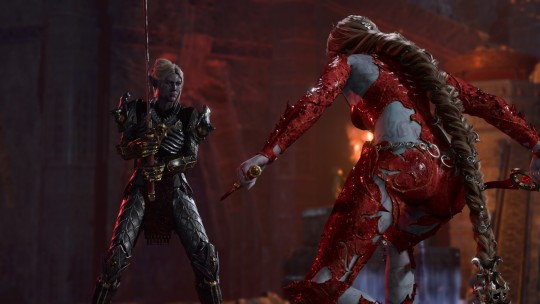
Minthara deserves the honor to solo duel Orin in a fight to the death. Minthara deserves the right to achieve vengeance for herself. No, I do not care that this confrontation would conflict with a Durge playthrough. In fact, it would provide a phenomenal source of some interesting, and toxic, drama between Durge and Minthara. Especially if they're in a relationship. This also does not mean that Minthara killing Orin instead of Durge would not have its consequences (because it most certainly will). Even if Minthara does not fight Orin, it would be so much better if Minthara was just given the fucking chance to yell at Orin like all the other companions in their personal quests.
#bg3#baldur's gate 3#minthara#minthara baenre#evil murder kitten#orin#orin the the red#i spend a lot of time theorizing what a good personal quest for minthara would look like#and i've even written a mock up personal quest for her#one in which could have a major impact on minthara's character and who she chooses to become in the end#but instead - all of you 'good only' players focus on the wrong things and would prefer to bastardize her character#just so you can feel better about yourselves#rather than look at what minthara needs for a proper character arc and genuine character growth#minthara's change should not nor should ever be along the lines of morality#but a deeply personal and internal one in which she makes the choice to change for herself#if minthara ever were to get more content#it absolutely should be about direct interactions and a confrontation with orin#i literally do not and cannot care about the rest#but she will never get what she actually needs because the whiny babies who don't appreciate her character#are crying and demanding all the wrong things that do absolutely nothing for her#and larian is bending over backwards and breaking her character just to make *you* happy#and denying her the justice she deserves#this is literally the only thing on my wish list for patch 7 - but i know it just won't happen#but i will hang on to the hope that i am proven wrong once it does release
130 notes
·
View notes
Text
The Eternal Bond of Solas and Lavellan
My sister challenged me to explore the depth of Solas’s love for Lavellan in Veilguard—a love I believe endures, no matter his choices or the challenges they face. It’s a perspective I’ve seen debated often, with some arguing that if he truly loved her, he wouldn’t have left, or that her love alone should have been enough to change his path.
While many have already explored this topic, truthfully, it’s something I’ve thought about since finishing Veilguard and therefore, couldn’t pass up the challenge. This post is obviously through the romanced Lavellan lens.
For context, my sister is a staunch Blackwall fan. She wasn’t exactly Solas’s biggest fan during her first Inquisition playthrough, but during subsequent runs, she softened. Eventually, my adoration for Solas won her over and she even played a run through where she romanced him, and found it bitter sweet (and then ran back to Blackwall).
But before we dive in, there are a couple of things that I take into consideration in this breakdown:
Solas’s decisions are shaped by millennia of experience and centuries of guilt and regret. He’s not just a guy making impulsive choices—he’s a being who’s lived through unimaginable pain and carried the weight of a broken world for ages.
Solas is immortal. It’s easy for us, as mortals, to judge his actions through our limited, human perspective. But how can we truly understand the mind of someone who’s lived for thousands of years, seeing empires rise and fall, burdened with trauma, guilt, self-loathing, and the scars of war?
That said, this mortal is going to give it a shot. Let’s go. A long post under the cut.
Inquisition – the Foundation
The seeds of Lavellan’s significance in Solas’s journey—and the path that could one day lead to his redemption—are planted during Inquisition. Lavellan challenges his detachment, offering him something he’s avoided for so long: a glimpse of the world as it is, rather than as it was. Through her, he begins to see beauty in what remains and starts to imagine a life connected to something other than regret and isolation. Her influence is foundational.
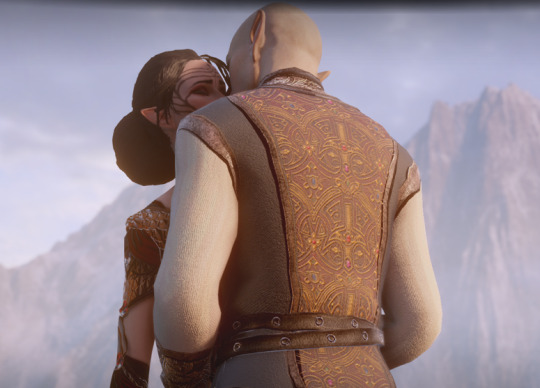
Solas’s love for Lavellan, and the transformation she inspires in him, doesn’t end with his departure. She lingers in his heart, shaping the internal conflict that is still to come.
Trespasser
The conversation between Solas and a romanced Lavellan in Trespasser is one of my favorite moments in the series. The different dialogue choices are filled with so much emotion and after two years apart, he still calls her vhenan and “my love.”
Lavellan’s faith that their love will endure meets Solas’s sorrowful wish that it could. The weight of their connection is undeniable. Unable to resist, he takes one last, bittersweet kiss before saving her life by taking the Anchor. Even after the Inquisition disbands (in my world state), Solas doesn’t completely leave—he lingers, though in a way that’s both haunting and ethereal.
The epilogue slides lay it out:
"Lavellan sometimes came awake from dreams in which her lover watched her sadly from across an endless distance. If they were more than simple dreams, she could not say, for every time she reached for him, he vanished into nothing. Still she searched, and dreamed, and waited, for a way to change the Dread Wolf's heart."
Even though they’re apart, his presence in her dreams shows the depth of his unresolved feelings. Watching her with sorrow from across an endless distance captures the conflict between his love for her and the path he’s chosen. Lavellan’s influence on him remains vivid and alive, a tether he can’t fully sever—even as he continues down his fateful road.
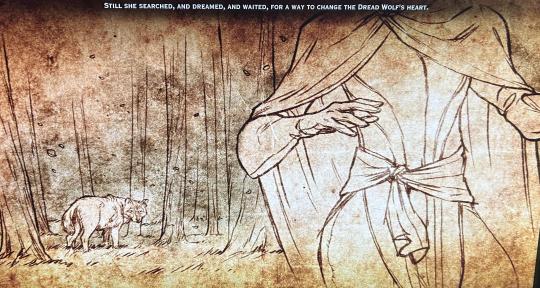
Veilguard – the Letter
Lavellan’s presence lingers for Solas in Veilguard, years after Trespasser. Her influence is woven throughout the letter he writes for her.
"Vhenan, I do not know if you will see these words."
He calls no one else vhenan. Starting the letter with this deeply personal term immediately sets the emotional tone. Even after all the years they’ve been apart, Solas still addresses her as his heart, reaffirming that she’s his most profound connection.
"My ritual is ready and will soon be set in motion. Perhaps when you read this the world will be as it once was, and you will see why all I did was necessary."
Beneath the resolve of committing to his mission, is a quiet longing—a hope that Lavellan will understand and maybe even validate the choices that weigh so heavily on him. Her opinion still matters to him.
What I particularly love is the phrase "...the world will be as it once was, and you will see...". Yes, it’s about his dream of restoring the beauty and harmony of the world he lost, but it also holds this fragile hope that she might still have a place in it. You can sense his desire to imagine a future where Lavellan remains part of his world—or his vision—despite the impossible circumstances.
"That night in Crestwood, when I shared the truth about your vallaslin… you do not know how close I came to breaking."
This part in the letter is such a window into how that moment has stayed with him. It’s clear that it still resonates with him, even after all these years. The way he admits he almost abandoned everything for her shows just how deeply her love impacted him. The word "breaking" says it all—it’s not just about weakness. It speaks to the massive tension between his centuries-old resolve and the pull of his love for her.
"I could have shared the truth, or even put my plans aside and simply stayed with you as Solas...as I wanted."
This confession is a raw admission of how much he wanted a life with her. The phrase "as I wanted" gives us a glimpse into an alternate reality he imagined, a life centered with Lavellan, one he ultimately denied himself for the sake of his mission.
"What I feel for you will never change."
This final line is everything. It’s Solas declaring that his love for Lavellan is eternal - because he is. Time, distance, guilt, and even the weight of centuries haven’t dulled what he feels for her. It also mirrors what he says to Lavellan in Trespasser, "I will never forget you." His devotion stands as this unshakable truth in a world full of loss and impermanence.
Whether Lavellan forgives him, understands him, or even sees his words, the letter shows us a man still tethered.
Rook as a Conduit
To me, Rook acts as a conduit for the voices that hold the most emotional weight for Solas—Lavellan and Mythal. Through Rook, we get to hear Solas talk about Lavellan directly, and what he says is just as revealing as the letter he left her.
Solas: “When I served the Inquisition, I tried to avoid entanglements.”
Rook: “Except for Inquisitor Lavellan.”
Solas: “I said that I resolved to do so, not that I succeeded.”
He went into his time with the Inquisition with a clear goal to stay detached. No bonds, no entanglements. But then Lavellan happened. Her love wasn’t something he could resist, no matter how much effort he put into maintaining his distance.
Solas: “She is a good woman. Growing close to her was selfish of me.”
When Solas calls Lavellan “a good woman,” it’s admiration and reverence. He doesn’t need to list her strengths outright; instead, his description of her as “good” reflects his personal definition of what that means.
He also says “She is a good woman,” not “She was.” He’s speaking in the present tense. This small detail makes it clear that Lavellan isn’t just a memory to him or a closed chapter in his life. Even after years apart, she’s still a living, active presence in his heart and mind. He still holds her in respect and love.
When he says growing close to her was selfish, he isn’t dismissing their bond. If anything, it’s a testament to how much he valued their connection, even though he knew it might ultimately cause her pain.
Rook: “Do you regret it?”
Solas: “I live with countless regrets. Some of them I have grown to cherish more than my victories.”
This dialogue sums up just how much Lavellan means to Solas. He’s lived a long life filled with accomplishments that, more often than not, came with devastating consequences. But his relationship with Lavellan stands apart. That cherished regret tells us that his time with her brought him something no victory ever could: meaning, fulfillment, and joy.
And then there’s the phrasing: “I have grown to cherish.” It’s also in the present tense. Lavellan’s impact on him isn’t just something from his past. It’s still alive, still deeply embedded in who he is.
Lavellan holds a unique and enduring place in Solas’s heart. Even with all the pain and consequences of their relationship, she’s still a source of warmth and significance—a constant reminder of how deeply she mattered and still matters to him.
Love Does Not Exist in Isolation
I’ve seen comments out there that if Lavellan really mattered to Solas, her voice alone would’ve been enough to stop him from tearing down the Veil. I disagree. It’s clear that it takes a village to sway someone like Solas—a wounded immortal being carrying millennia of guilt and regret. Lavellan’s voice is absolutely foundational, but it’s part of a broader tapestry of influences that all come together at a critical moment.
Solas’s decision to tear down the Veil doesn’t come from a lack of love for Lavellan. It’s rooted in overwhelming guilt and this deep sense of obligation to his people, to Mythal. Her voice matters because she was one of the first to challenge his beliefs. But hers alone couldn’t undo the weight and trauma of millennia. Voices like Mythal’s were necessary too.
When Mythal releases Solas from her service, it’s a pivotal moment. It’s a severance of the bond that defined so much of his existence. For Solas, it’s freeing—but also incredibly painful. It forces him to reckon with his autonomy, to face the choices he’s made without the shield of loyalty to Mythal. For a man who’s been carrying so much self-loathing and regret, what a deeply uncomfortable and transformative moment.
Then there’s Rook, who also plays a crucial role. Before Lavellan and Mythal appear, Rook is the one directly speaking to Solas, urging him to see the world and its people as worth saving. But once Lavellan (followed by Mythal) steps onto the stage, Rook falls silent. It’s as if they instinctively know their role has shifted. It’s no longer their place to persuade; that responsibility now belongs to Lavellan and Mythal.
Of those voices, it is Lavellan’s that lingers as the last. Hers is not just a plea for him to reconsider his mission - it’s an affirmation that even in the face of millennia, their love is a truth he can’t deny.
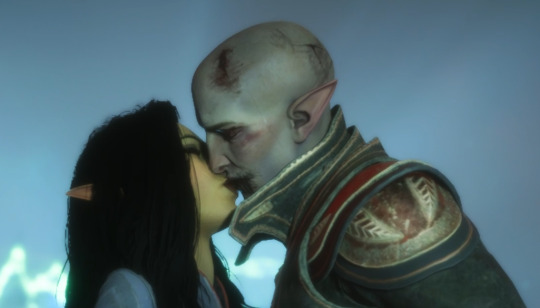
Through the Lens of Immortality
For a mortal, it might be easy to see Solas’s love as fleeting because of how short-lived it was. What’s a year and a bit compared to thousands of years? But for an immortal being—and someone as spiritual as Solas – I would think the depth of a bond matters more than how long it lasts. Solas’s love for Lavellan isn’t diminished by how brief their time together was; if anything, it’s magnified by its intensity—a flicker of light cutting through the endless darkness of his existence.
And for someone who’s immortal, memories don’t fade the way they would for us mortals. Lavellan’s influence on Solas will stay vivid and eternal, untouched by time. Even though their time together was short, her presence is etched into who he is. Her love became this cornerstone of his internal struggle—something he wrestled with but couldn’t fully let go of. He almost gave it all up for her.
For an immortal, loving a mortal is a whole different kind of courage. It’s choosing to embrace something fleeting and fragile, knowing it will end. And still, Solas chose to love Lavellan. A bright chapter in a life that’s otherwise been filled with pain, loneliness, and time stretching endlessly in every direction.
So yeah, she matters.
At least, that’s how I see it.
#solas#solavellan#solas x lavellan#dragon age#dragon age veilguard#dragon age inquisition#I love them#I can't help myself#immortal perspectives - from a mortal mind#mythal#OldDAArchives
643 notes
·
View notes
Text
FNAF Movie Theory...
I'm pretty sure there's still one major plot twist in the universe of the movie that's been set up for a sequel but hasn't actually happened yet. Heavy spoilers under the cut:
After watching the movie in theaters and then revisiting a few scenes on Peacock, I'm still kind of convinced that Mike Schmidt is Michael Afton.
Here's my reasoning. A lot of the characters spend time acting like they know something the audience/other characters don't, and those things are...mostly resolved. But some of them just...kind of aren't.
The main thing that sticks out to me is William's whole storyline. Starting with the scene where he offers Mike the job, his behavior is almost explained by the movie's logic. He sees Mike's name, seems...kind of deeply upset, looks at him very closely, stands to get coffee, and has a moment of visible internal conflict. Then he instantly offers him the Freddy's job. The way the movie frames this, it seems to be saying that he recognized the name of one of his victims, realized this was the kid's brother, and decided to kill him right then and there. Which is passable as an explanation, but it has a lot of holes, if you look deeper.
Why would William so instantly recognize a fairly common last name as the brother of some kid he killed that wasn't even anywhere near Freddy's? Why did he kidnap/kill Garrett in the first place, in some random forest in Nebraska? Why did he see the name on the file, then immediately stop and examine Mike's face so closely, when Mike's memories/dreams pretty clearly show that they never saw each others' faces when Garrett was taken? Why did he send Vanessa to "keep Mike in the dark" if he purposely gave him the job to get him killed? Why not have the animatronics kill him right away? He didn't know that Mike was searching for the man who took his brother, and while he could have maybe guessed he was still actively haunted by what happened based on Mike beating up a guy that he thought was kidnapping someone, it still feels like a weird choice to go and hire him, then just have him do the job with no issue for a few days.
As for Vanessa, we see that she's been cleaning up William's messes for years. Why is Mike the one she changes her mind and stands up to her father for? There's no implied romance between the two and no particularly meaningful connection beyond them both having family issues. I guess she cares about Abby because she's a kid, but kids getting hurt clearly never stopped her from helping her father before.
And, on a more meta level, this is Scott and his storytelling style we're talking about. The man puts plot twists inside of plot twists and everything always ties back into the Aftons, somehow.
So, here's my theory: I think that Mike is William's kid, but Mike's mom left Afton when he was young and remarried the man that Mike thinks is his father.
It seems convoluted and maybe cliche, but if it's true, then suddenly there's an answer to all of those questions. "Michael Schmidt" isn't exactly an eye-catching name, unless you had a kid named Michael and your ex-wife married a guy with the last name Schmidt. Garrett's kidnapping, then, becomes an act of intentional, petty revenge rather than an extremely random coincidence. Giving Mike the job and sending in Vanessa suddenly becomes about piecing together how much he knows and figuring out if he's worth trying to reconnect with or is just a threat that needs to be killed. (It feels worth noting that William is as far as I can remember the only person to call him Michael in the whole film. He also very pointedly never says "Schmidt" until he's decided to kill Mike and suddenly announces his full name out loud. If he went by Michael as a little kid, that is what William would default to calling him, but if he took the new husband's last name, that would be like like salt in the wound that he wouldn't want to voice. By finally saying it out loud, it feels like he's making the decision to fully separate himself from Mike.)
As for Vanessa, if Mike is her brother, it makes sense that he would be the person she'd turn against William to save. It would be weird for her not to tell him, but she could also be trying to protect him, in some way. There's never any mention of her mother, and it seems like it's just been her and William for a long time. Also, ending the movie with her in a coma feels like a strange narrative choice, but it makes sense if she knows information that's purposely being kept hidden for the sequel.
Of course, it could just be that the movie has kind of messy writing and I'm trying to fix it because I want there to be a deeper reason for it. Maybe there is no Michael Afton in the movies, or maybe he's off chilling and doing his own thing somewhere and we'll see him in the sequel. Only time will tell.
#fnaf movie#fnaf movie spoilers#five nights at freddy's#five nights at freddy's spoilers#michael afton#mike schmidt
901 notes
·
View notes
Text
Agatha and Rio zodiac signs aka hear me out about Rio’s sign essay
So Agatha is clearly a water sign, most likely Scorpio. She is extremely smart, vindictive, and internalizes like no other.
She also cares so deeply that it probably even scares her sometimes. A big Scorpio thing is being afraid of being vulnerable because they know deeply they feel. Probably why she reacted so intensely toward Rio about Nicky. In her mind, she had opened herself to love and that same love took away her baby. Plus she is so a scorpion and is very much like the scorpion and the swan with her little Road deception.
I know Rio being Lady Death technically has no birthday but this is for FUN so aint no one be a wet blanket here please.
This is going to surprise people and it is definitely out of my bias of being this sign but I believe Rio is a Libra.
HEAR ME OUT
Libra’s symbol is a scale. It is the only zodiac sign that is not represented by a living thing. Rio is above all living things and like Libra the scale, is all about balance. It is also an air sign which again given her mysterious and spiritual nature makes sense.
She is bothered by things like ghosts and Billy reincarnating into a dead body because it opposes the natural balance.
Now onto personality stuff, Libra’s are known for being aloof but charismatic. Very much how Rio presents herself. She is also quite gentle and soft in her own special way and knows how to make the people she loves feel cared for (the flowers for Agarha, defending her against her mother and the coven turning against her, being sweet with Nicky when it was his time holding his hand).
However the aloofness and need for balance can can work against her relationships like having to take Nicky, telling Agatha Billy isnt her son because it was the right thing even though it meant not getting to be with her love.
Libra is also a sign that is known for romance and needs partnership to be balanced within themselves. Rio is extremely romantic with the gift giving and physical touch love languages (she touches Agatha A LOT).
And she is one needy little Death Lady. Her desperate need to be with Agatha again is very obvious and she doesnt even try to hide it. So much so, she went against her usual balance and let Agatha have time with Nicky. She is so deeply in love with Agatha and do anything for her but also because she loves Nicky she had to take him when she did as he was sickly and suffering.
Perhaps she could have let him live so Agatha wouldn’t hate her but because she is selfless and couldn’t let him suffer she did the right thing (plus he clearly wanted to go and was tired of being sick).
The Rio we see in the current time having been apart from Agatha for centuries and knowing she is hated by the one she loves for something she didn’t have a choice doing has clearly changed her. Like a typical Libra she is completely unbalanced without her wife, her partner. And all her more negative Libra qualities come out.
Her aloofness, tendency for passive aggressiveness, the “weird girl” vibes in the group despite being her usual social Libra self and having no problem interacting with the coven all while knowing they’re doomed. Isolated from yet together with them. Like the Ballad says, “together and alone.”
And finally, Rio’s behavior when attacking Agatha in both the beginning and the end is the ultimate show of a Libra at the end of her rope. Rio is not one to lose control especially how she did in the final fight. She is Lady Death after all. But this comes after CENTURIES of being ignored, being demonized undeservedly. And what does a Libra hate more than anything? Injustice and this one is deeply personal. She did what was best for their son and got punished for it.
Yet she never stopped loving Agatha. She defended her against her mother, the coven, tried her best to reconcile with her and explain herself only to be told Agatha never wants to see her face again.
So she attacks explosively, theatrically, like never before. And yet she STILL loves Agatha and cries out her desperation of wanting to be loved back. “Why don’t you want me?” Even after Agatha called her evil. Still a Libra, needing to have her person, and forgiving when Agatha kisses her because that’s all she’s ever wanted.
Then after losing the love of her eternal life, she shuts down, returning to her skull form. Her deepest scar having been ripped open. A traumatized Libra will retreat into their aloof tendencies.
And all this long ass essay is my extremely biased reasoning for Rio being a Libra. Thank you for coming to my TedTalk.
#agatha harkness#agatha x rio#agatha all along#rio vidal#agathario#ragatha#agario#aubrey plaza#kathryn hahn#marvel#mcu#nicolas scratch#libra#zodiac#scorpio
85 notes
·
View notes
Text
Why are you, as a woman, still taking a man’s name in 2025? Historically, when a woman married, she was legally absorbed into her husband’s identity— she lost many legal rights, including the ability to own property, enter contracts, or even retain her own name. Women were viewed as property, and changing their name solidified the idea that they were no longer independent individuals but extensions of their husbands.
When women couldn’t vote, when they weren’t recognized as people. And yet now you’re still willing to give up your name for him?
“It’s just easier”
Easier for who? Not for you, the one who has to do all the paperwork, file the forms, update your drivers license, social security, passport, bank accounts, credit cards, voter registration, insurance policies and healthcare information.
Or do you mean it’s easier than having to put up a fight with your husband? It’s easier to comply with a system that prioritizes men’s names over women’s autonomy?
Many oppressive traditions are “easier” when followed—but that doesn’t make them just or necessary. In the past, it was “easier” for women not to work, not to vote, or not to challenge social norms. That doesn’t mean those norms were fair.
Women are socially conditioned to choose the “easy” path, which usually means the path of least resistance. But in reality, every woman who keeps her own name makes it easier for the next woman to do the same. Change only happens when people stop choosing the default just because it’s there.
At its core, this excuse is really saying: “It’s easier to conform than to challenge a patriarchal norm.” And while that may be true, that doesn’t mean the norm should go unchallenged.
“His last name sounds better than mine”
If this decision is truly about aesthetics, why isn’t he considering changing his name to yours? The fact that the expectation is one-sided shows that this “preference” operates within a system that assumes women will give up their names, not men.
I find that the idea that a woman’s last name isn’t “good enough” usually comes from external influences—whether it’s societal norms, beauty standards, or even internalized sexism. Women have been conditioned to believe their identity is more flexible, while men’s names (and legacies) are non-negotiable.
Even if it’s a personal choice, the outcome is the same: a woman’s birth name disappears, her family’s lineage is cut off, and her identity is absorbed into her husband’s. Aesthetics aside, this continues the long history of women being expected to conform to male-centered traditions.
If the concern is phonetics, why not create a brand-new last name as a couple? The fact that this option is rarely considered reveals that this is less about preference and more about upholding the norm that men’s names take precedence.
At the core of this reasoning—no matter how harmless it seems—is the expectation that a woman must adapt to fit her husband’s identity, rather than both partners making an equal decision. It’s one more way that patriarchy disguises itself as “just the way things are.”
“I don’t want to hurt his feelings”
If keeping your name is important to you, why is his emotional reaction the deciding factor? This excuse implies that a man’s sense of tradition or entitlement to your name outweighs your right to maintain your own identity. That’s a direct reflection of the expectation that women should be the ones to compromise in relationships.
This is an excuse that plays on the assumption that a woman asserting her independence is inherently a threat to a man’s ego. But why should a woman’s personal decision—about her name—be seen as an attack? The fact that this is even a concern reveals how deeply ingrained male dominance in marriage still is.
If a man feels hurt or disrespected because his wife keeps her birth name, it suggests he views her identity as something he is entitled to change. That’s a problem. A healthy partnership should be built on mutual respect, not on the idea that a woman must sacrifice parts of herself to keep a man comfortable.
If a woman told her husband she’d be hurt if he changed his name, would society validate her emotions the same way? Probably not. Men are rarely expected to make name-based sacrifices in relationships, showing that this is less about feelings and more about control.
At the end of the day, this “excuse” reflects a larger reality: women are conditioned to prioritize men’s emotions, often at their own expense. A man who genuinely respects his partner should see her decision to keep her name as exactly that—her decision—not as a personal attack.
“It’ll be easier for the kids”
Blended families, unmarried parents, same-sex couples, and families with hyphenated or entirely new last names all exist without issue. A child doesn’t need a specific last name to feel connected to their parents.
The idea that a family must have one name for simplicity is only an issue because we live in a system that expects women to change their names. If keeping a woman’s last name caused confusion, why isn’t the solution for the husband to change his name instead?
Couples can hyphenate, combine names, or even create a brand-new family surname. The fact that these options are rarely considered reinforces the idea that the default should always be the man’s name—continuing the cycle of erasing women’s identities.
“I like the idea of a fresh start”
If this were truly about both people stepping into something new, why isn’t the man equally expected to change his name? The fact that this “fresh start” only applies to the woman shows that it’s not really about reinvention—it’s about assimilation into the man’s identity.
The idea that a woman can “start fresh” by discarding her birth name suggests that her name is disposable—something she can shed at any major life transition. Meanwhile, men’s names are seen as stable and unchanging. That’s a reflection of patriarchal tradition, not true equality.
A fresh start can come from many things—marriage itself, a new home, shared experiences—not just a name change. The fact that society pushes name-changing as the primary symbol of commitment reveals that it’s not just about personal choice, but about upholding a system that expects women to conform. You can “start fresh” without losing something
“I want to feel like one unified family!”
But why does this unity always required the woman to give up her identity rather than the man making any concession? You’re aligning yourself with the belief that women should always be expected play a secondary role
19 notes
·
View notes
Text
Okay so like—maybe I snapped. Maybe I had one too many matcha lattes and accidentally opened the comments section. My bad. But why is the internet so obsessed with turning every female creator into a public property with a user manual? I swear, the moment a girl dares to glow up, speak up, clap back, or—God forbid—get a boob job, people act like she burned the constitution. And I’m just sitting here, with my emotional support hoodie and a rage migraine, wondering: when did we decide that personal growth is betrayal? When did female autonomy become public offense? Why is every girl online either a saint or a sellout? No in-between. I’m so over this. Like fully, aggressively, “make-an-essay-and-quote-it-on-Tumblr” over this. So here. Enjoy the thesis, besties.
On Clara Dao:
The Clara Dao discourse reveals more about the public’s unresolved projection complex than it does about Clara herself. To dissect the backlash through a lens of socio-psychological behavior, it becomes evident that many individuals tethered their own body image recovery journey to her personal choices—creating a parasocial dependence wherein her perceived authenticity was conflated with collective healing. Her decision to undergo a breast augmentation is not a betrayal of self-love or naturalism; it is, in fact, an embodiment of bodily autonomy. One can embrace radical acceptance and still wish to edit aspects of themselves—not out of internalized hatred, but nuanced self-direction. Growth, as both a scientific and emotional phenomenon, is non-linear. To accuse her of being a hypocrite is to deny her personhood and human complexity. Clara was never a brand; she is a breathing person. And persons are allowed to evolve.
Moreover, this demand for moral constancy—this insatiable appetite to freeze influencers in the era they first rose to fame—suggests a subconscious resistance to female transformation. Particularly transformations that involve power, visibility, and desire. Clara’s aesthetic change becomes threatening not because she lied (she didn’t), but because she dared to want more. Her platform may have helped others love their bodies, but that never meant she signed a social contract to remain unchanged for the sake of public comfort. This expectation is both emotionally parasitic and ethically absurd. The truth is, Clara Dao owes no one the stagnation of her former self. She owes only herself the permission to evolve.
On Lala Sadi:
The vitriol toward Lala Sadi reeks of performative moralism disguised as cultural critique. What people call “inauthentic” or “too much” is actually a coded rejection of female enthusiasm, exuberance, and non-linear emotional narratives. We live in a digital ecosystem where a woman being loud, passionate, or dramatic is criminalized under the pretense of “annoyance” or “dishonesty”—as if performativity isn’t the nature of content creation itself. Lala’s content has matured. Her voice now holds more depth, more self-awareness, and yet she remains unapologetically herself—which, ironically, is exactly what everyone demanded of her. But when real emotion doesn’t align with the public’s projection of what “real” should look like, they call it fake. She was never a liar. People just don't know what it means to be a full, layered, chaotic woman on the internet.
On Apoorva Mukhija:
Apoorva Mukhija, or “The Rebel Kid,” is not the villain of her narrative—she is its most brutal casualty. What occurred on that stage was not “banter” or “harmless teasing.” It was a microcosm of a deeply embedded misogynistic power dynamic, where a woman reacting at all becomes a moral infraction. The way her assertiveness was reframed into aggression reveals society’s deeply conditioned fear of the angry woman—a woman who speaks up, who doesn’t laugh off humiliation, who doesn’t self-deprecate to cushion male egos. The threats she received—death, rape, acid—are not just online “hate.” They are gendered terrorism. They are meant to frighten women into silence and submission. This isn't drama. This is the digital enactment of patriarchal control.
Furthermore, the hypocrisy here is bone-deep. When men clap back or “roast” others on the internet, they’re crowned as clever and bold. When women do it, especially in response to something violating, they’re painted as vindictive and attention-seeking. Apoorva didn’t attack someone for the sake of virality—she defended herself when disrespected publicly. And yet somehow, her defense became the crime. This is moral distortion at its finest. It’s the public convincing itself that women must earn the right to be angry. That women must be pleasantly oppressed. What people wanted wasn’t an apology—they wanted to punish her for not making herself smaller in a moment that demanded strength.
Finally, let us speak of the silence. The influencers, the male creators, the audience that laughed or stayed quiet or rebranded their complicity as neutrality. Their indifference was not passive—it was violently loud. Apoorva stood alone. She was devoured for breaking character in a play that demands women smile through pain. But she didn’t. And that, more than anything, was her crime. That she refused to be a good girl. That she raised her voice, stood her ground, and exposed an entire system with one moment of unapologetic fire.
#body autonomy#internet morality crisis#clara dao deserves better#lala sadi was real#justice fro apoorva#influencer double standards#the female glowup scares them#moral policing is not feminism#let women change#loud women are valid#stop weaponising relatabilty#not your digital doll#feminine rage aesthetic#tumblr thesis#she was loud and she was right#they hate women who clap back#pretty and powerfull's a threat#main character energy unlocked#messy girls deserve peace too#big thoughts small waist no mercy
8 notes
·
View notes
Text
okay. fuck. i need to talk about be my favorite. because jesus christ, this might be THE smartest show currently airing, which is a miracle at a time when la pluie is also airing.
so, this episode we learned more about kawi's and pisaeng's family backgrounds, and oh boy, is there a lot to unpack there... and it all works to explain why the original timeline was the way it was, why everything turned out so fucked up for both of them in the beginning.
(very rambly thoughts under the cut)
first of all, it's important to note how much of an impact kawi's father's death had. it was always clear that this was a traumatizing event in kawi's life, literally the first thing he did when he went back in time was to ditch the (supposed) girl of his dreams so he could be with his father, tearfully hug him and tell him "i love you, dad".
now, we're learning that after his father's death, kawi completely gave up on himself. he literally didn't see any reason to pursue a better life or his dreams because his father would never get to see it and be proud of him. i think this also explains to some extent why kawi has so much trouble accepting help from others: he has internalized the idea that he somehow has to do everything on his own, so his father (and others) can be proud of him. it's interesting that kawi obviously loves his father a lot but they're not really close: they don't see each other very often and in the first episode, it's established that they don't usually talk to each other about their feelings, either.
so. everything else that happened to kawi in the og timeline (knot making fun of his singing, pisaeng "stealing" his spot as pear's secret buddy, his falling out with max, kawi being too much of an introvert to make any new friends at uni) was compounded by the fact that after his father's death, kawi saw no hope for himself any more, and he ended up alone, isolated, friendless, depressed and deeply unhappy.
and now that we're learning more about pisaeng as well, it's becoming clear that something similar happened to pisaeng in the og timeline as well, only for him it was not a single event but more the reality of him being gay and having a crush on kawi (come on. nobody can tell me he DIDN'T crush on that cute awkward nerd as soon as kawi dropped his lil notebook in front of the seniors on the first day of uni), but kawi never even speaking to him and completely ignoring his existence... while pisaeng's own mother was adamant about pisaeng staying as deep in the closet as possible because it's bad for her political ambitions to have an out gay son. she basically tells him "you can feel whatever you want to feel but telling people about it is something that you should only do with my permission".
so, pisaeng has been getting told by his mother to stay in the closet since he was 15 years old (JESUS!!!), and since his crush is obviously unrequited and hopeless, why should he risk anything by being honest about it? his family is rich, pear's family too, their marriage is one of convenience for pisaeng, who gets to keep living his good life while placating his mother and spending his life with a person he's friends with, even if he can never love her romantically. from his mother's perspective, pear and pisaeng must be a good match, and pisaeng has no real reason to fight any of it. because coming out as gay would do nothing but cause him trouble and make him unhappy.
but in the new timeline, kawi is there as pisaeng's friend. and pisaeng falls for him so much deeper than he ever could have done in the og timeline. and now he HAS to figure himself out, HAS to confront his own queerness, not for kawi or even with kawi (utterly brilliant choice in the last episode to have pisaeng go on this journey alone!) but for himself, because it is becoming clear that he is living a lie and that he can't go on like this. having kawi in his life changes everything for pisaeng -- even if they weren't in a bl and were simply friends, this storyline would still be incredibly compelling because even while they're not in a relationship, kawi and pisaeng keep challenging each other, keep changing each other, keep making each other better, more honest people.
when they're in bed together and kawi asks why pisaeng likes him, he says much of the same stuff he's said before: that pisaeng is better, richer, more handsome than him, that he can't understand what pisaeng sees in him. but he says it differently this time, not with anger or defiance like in the beginning of their friendship, but so honestly, he's able to open up to pisaeng in a way he never could before just because he has had pisaeng in his life and they have had an impact on each other.
i keep coming back to this because it's something i rarely see in stories and bmf is doing it AMAZINGLY. both of the protagonists go on a journey of growth and self-improvement through knowing each other, they literally make each other better. and even though kawi is not at a point where he can see them as equals, he can honestly talk about this now, can voice his feelings of insecurity in a way he was never able to before -- and so, pisaeng can say, well, i think you're cute, does there have to be anything more to it than that? he doesn't try to talk kawi out of his self-perception, merely states his own perception of him in a way kawi can't argue away. i think this is a smart writing choice because kawi has to accept that pisaeng finds him cute, he can't say "no you don't" without accusing him of lying.
and oh, my baby kawi being so incredibly deep in denial is tugging at my heartstrings. there's a very interesting parallel happening with kawi's singing, something he was obviously dreaming of as a career when he was a child but completely gave up on -- until pisaeng and pear helped him gain confidence to put himself out there once again. i think something very similar is happening with his sexuality: he has shoved the truth of himself so far back in his own mind that it takes a long time and the knowledge that pisaeng is into him for kawi to even entertain the thought of maybe also being into him maybe. there's a certain safety in that, just like there's safety in having pear there while he reads his song lyrics to a room full of people. and that's not a bad thing! this show has consistently shown (and outright told) us that people need to help each other, that literally no one is capable of making it on their own, that everyone deserves love and support. and kawi needs a lot of love and support to be able to even let himself think of pisaeng in romantic terms. i am seriously excited to see what happens next, now that kawi has crossed the line between them, now that he got a taste of what he could have if only he let himself.
there are probably a million things i haven't said that i can't think of right now. but every single episode leaves me more impressed than the last, the story is written SO well and presented in such a smart way, later revelations recontextualizing things we already know, and with every week, everything makes more and more sense. and learning more about their families really explains a lot about all three of them (god, i haven't even mentioned pear's rich upper-class alcoholic father, a lot to unpack there as well!), and how they got where they were in the og timeline as well as in the current timeline.
thanks for reading 😘
267 notes
·
View notes
Note
I wonder if it turned out that Orin got pregnant by a Ghost, what would they do and how would they behave (especially Orin, given her character) And I was wondering what Sarevok meant in the dialogue with the dark urge, that Orin had treated him badly🤔
Oh, god, neither of them should be allowed to be parents.
That's not to say I haven't thought about it. You know, I'm usually not the sort of person that thinks much about characters having children (I can't say I've ever really thought about it much before for any other characters in which I've been interested), but the possibility of the two of them having a child together has haunted me for quite a while now, primarily for the reason that it's One Simple Thing that could make their already deeply messed up situation significantly worse.
From a purely practical perspective, neither Ghost nor Orin would particularly enjoy having a child around. Ghost is too self-interested, impatient, and easily repulsed to deal with a child, especially an infant. And Orin, based on her own childhood, has plenty of reasons to be suspicious of the consequences of having a child; as it grew up, she would grow increasingly fearful that Bhaal would come to prefer her child over her, an event which history tells would likely end in Orin's demise. But aside from that, I also can't imagine that she'd be a good parent, given that she never experienced much parenting herself.
That being said, I think they both desperately fantasize about conceiving a child together. A lot has already been said about the apparent innate Bhaalspawn urge to propagate more Bhaalspawn, so I've little to add on to that thread; suffice to say that the two of them talked quite a lot about it, primarily while having sex.
There were several years before the betrayal when Niro and Orin were rawing each other regularly. Barring other causes of infertility, it's pretty remarkable that they didn't actually conceive a child during that time, and I believe that that's no accident or matter of luck. No matter how appealing she personally found the idea of conceiving a child, I think that Orin was responsible for preventing them from actually doing so (though I'm not sure she did so intentionally).
(What follows is fully my own take on Orin; I make no claims to this being rooted in her canon, even more so than usual.) I think Orin does not have a biological sex, by which I mean that when she was born, she possessed no recognizable external sex characteristics, and in the years before she could control her shapeshifting particularly well, her apparent biological sex changed regularly enough that she had no clear "true" sex. By the time she reached maturity, biological sex was completely arbitrary to her. Her body often appears to have a biological sex, but sometimes it doesn't, and she mixes and matches parts as she pleases. I believe her control over her sex extends to her internal reproductive organs, which she lacks by default, but which might be possessed by forms she takes on.
(As an aside, I think it's an interesting duality that, in my own personal canon, Orin has a gender but lacks a sex, while Niro has a sex but lacks a gender.)
In the time before the betrayal, I think that she chose not to possess internal reproductive organs for much of the time that she was having potentially-conceptive sex with Niro. I'm not sure how conscious that choice was; it may have been an internal decision she didn't even realize she'd made, motivated by that deep-seated fear of the potentially life-ending consequences of bearing a Bhaalspawn child.
I don't think the possibility of them having a child is fully off the table in the Ghost-returns-to-Orin canon. It'd be a long ways down the road, certainly, but I think there are circumstances under which they could both end up drifting down that path. Those circumstances would almost certainly be messy.
They'd absolutely have an interesting-looking kid, though.
As for the question about Sarevok's lines regarding the relationship between the Dark Urge and Orin: as a general rule, I'm very willing to believe that the statements made by characters in game, particularly known villains, are motivated statements that are not necessarily true. When the Dark Urge is speaking to Sarevok in game, Sarevok appears to have an interest in encouraging a conflict between them and Orin. It is my opinion that that is sufficient motivation for him to say what he believes will help incite that conflict, namely, sowing seeds of vengeance in the mind of one who seems not to remember very much about the truth of that relationship. I think my overall thesis here is that (1) it is perfectly reasonable that Sarevok said to Ghost that Orin treated him badly if Sarevok is lying, and (2) Sarevok has very clear reasons to lie and no clear reasons not to lie in that scenario.
#thanks for the two very interesting questions!#I feel like my ask responses get longer and longer each time lmao#durge ghost#durge ghost lore#niroszelys auvryndar#durge x orin#orin the red#sarevok anchev#ask
9 notes
·
View notes
Text
Succession Thoughts: Gerri x Roman
1. Forsaken.
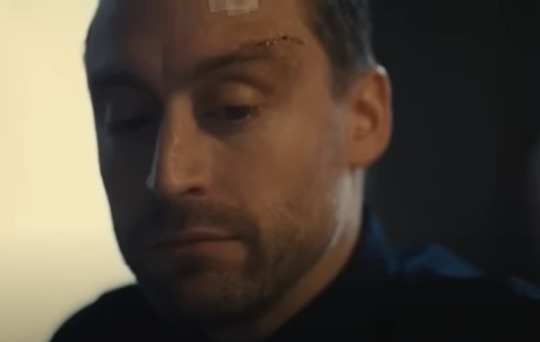
I’ve finally gotten around to writing my final Succession Thoughts post. I thought it was to take some time to ruminate on the finale, even if that meant putting the post out later and potentially reaching a smaller audience after the high of the final season had worn off. A lot of the chatter on social media surrounding this ending scene was interesting to me. Many people interpreted Roman’s drinking of the martini, and his smile at the end, as a sign of possible hopefulness regarding his relationship with Gerri. A possibility of things in the future. A chance to call, to reach out and start over. I disagree. The final, seconds long glimpse of his face after his smile fades tells the truth, the real truth in their relationship that people are wanting to ignore which is that it is over, and he knows this. I wrote last season about the basic problem between them being that Roman comes from a place of authenticity in his interactions with Gerri (however flawed his efforts may be), while Gerri is more calculating and always willing to look out for number one. The end to their liaison proves as much. Roman made a good number of mistakes on his part, and contributed as much to the downfall as she did, no doubt, but the real crux and the torment between them is that Gerri is wired to look out for herself no matter what, and discard what she no longer needs. She discarded Laurie once he’d served his purpose, likely discarded Martyn too (who she seemingly only brought to the wedding to make Roman jealous), and, finally, set Roman aside once she was done with the company and didn’t need him anymore. I’ve touched on this quality in her personality numerous times over the course of the show’s run, and in the end, that part dominates her so deeply that she is unable to really form any lasting connections. While Roman is looking for a place to feel safe, to be nurtured, for someone to help him grow, Gerri looks at people for what they can do for her, for their usefulness to her. This is not to say she did not genuinely have feelings for Roman. I believe she did. But this is to say that, in the war against the self, what is inherent to a person will always win out, whatever quality that is. One can try to find better qualities, different qualities, other aspects, but who a person is deep down inside will always lead to the inevitable outcome at the end of the day. And so it did with Gerri. All of Roman’s attempts to nurture something better in her, to connect to her, to bring out something softer worked for a while, but ultimately her cold nature won out and things ended as they always would. And really, the signs were there from the beginning for those willing to see them. While Roman, by the end of the show, seemed to grow and change into someone different, someone who realized the family company served him no greater purpose and was subsequently able to move forward, Gerri remained...well, herself. She’ll go on to do the same thing as before somewhere else while Roman gets to forge a new path, equipped with the lessons he learned from her and from making his mistakes. This is the real tragedy inherent in their relationship, in my opinion. They are two people from the same world, with similar beliefs, similar backgrounds and values, and yet, they are destined not to remain together because internally they are too different. That’s the real tragedy of this show--it’s not the overall occurrences that make things so painful, it’s the tragedy of the self and what, inherently, we are unable to overcome.
2. Mother Monster.
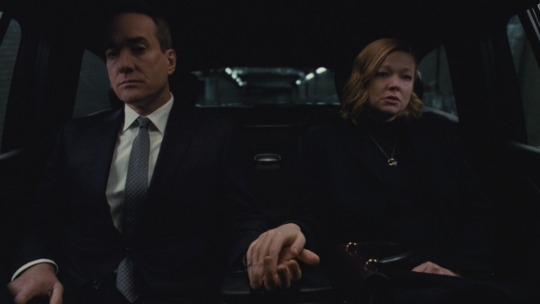
I don’t often touch on other relationships in these posts, but I must say that seeing Tom take over Waystar was so satisfying to me. What fascinated me was the amount of people who were either surprised Shiv would screw her siblings over, or tried to convince themselves that her choice was due to “misogyny”. Everyone’s entitled to their opinion, but in my view, both of these are wrong. Shiv, to put it simply, screwed her brothers over because this is who she is at her core. This is who she has always been. She looks out for herself at the expense of others, and at the end of the day, her narcissism caught up to her. She ended up like the mother she despised--stuck in a marriage to a man she has no love for and set to become a mother to a child she is not interested in. Tom, for his part, ended up at the top because, really, after having been saddled with so much suffering, there was no other way to go but up. He was a black sheep in a family of wolves and he learned how to play their game better than his wife, and won as a result. Shiv’s choices have to do with who she is at her core, which is revealed during her fight with Tom in Tailgate Party. The irony of their fight--which begins about her starting the rumor that he will get fired--need not even be touched on. When she says to him, “You’re servile [...] you don’t deserve me, and you never did” she’s essentially echoing what her father told her in season one, which was that she was marrying a man below her station because she could control him. Sadly for her, her self-serving ways caught up to her and now she is victim to the fate she deserves--wife to someone with more influence and power than she will ever likely have again. For all her torturing and disdain for Tom, she ended up in the position she wanted him in, and that is immensely satisfying.
AN: A huge thank you to all who have read these posts over the time I’ve been writing them. It’s been so satisfying to be able to interact with other fans who enjoy the same thing I do, and to contribute--in some small way--to the ever-evolving discussion surrounding the show. If I see anything interesting regarding Roman and Gerri floating around on the internet, I’ll post it here. As unfortunate as it was that the show ended--even though I believe it ended at the right time--the real loss for me will be the community I managed to find here, and the exchanges I had with others along the way. My inbox is always open for those wanting to chat some more, I welcome any messages, and I can’t wait to hear what you all thought about the finale. Thank you again, it’s been an immensely gratifying journey.
#gerri x roman#gerri/roman#gerri kellman#roman roy#succession#succession hbo#hbo succession#succession thoughts
19 notes
·
View notes
Text
S3E3 "Fortunate Son": The past alive in the present
This episode invites us to look back at Tony's childhood, and just as much to look back at our own experience of Tony as viewers of the show. The pilot episode and the inciting event of the whole series drive Tony's realization, which also reminds us, the viewers, that this show is just a snapshot of Tony's life. We are only given access to his past to the extent that it is incarnate in his present. But it is vividly incarnate in his present.
This is one of those Sopranos episodes that changes our perspective not just on everything that comes after it, but much of what came before.
Looking back just a little, to S2E6 "The Happy Wanderer", Tony's exploitation of Davey Scatino's gambling addiction takes on a totally new meaning in light of his experience with his father. Johnny cut off Satriale's finger over a gambling debt, and then rationalized it to Tony by suggesting that an unpaid debt devalues a person more than indulging in violence. That Satriale may be a nice man, but he put himself in this situation. Exactly the justification Tony makes about Davey.
(It's probably worth noting that Tony never cut off Davey's finger -- and while his interactions with AJ in this episode make a weird parallel to his interactions with Johnny, he still seems like a better father than Johnny did. He's passing down a softer punch.)
As a kid, Tony is vividly aware of the connection between violence and survival for his family -- that the hands that cut the meat for his baby sister are the same hands that cut off Satriale's finger -- and because he had no way to escape that world he could only cope by rationalizing it. He deeply internalized what his father told him, and it became possibly the first pillar of his rationalization of this lifestyle. And by extension it became a pillar holding up his entire world.
Looking back a little further, to S1E5 "College", we know Tony once attended college, too. When Tony was approximately Meadow's age he had another world, another life, available to him. But, just like Meadow, he ultimately rejected it and returned to the world that was familiar to him.*
Maybe he worked too hard to rationalize this world as a child and now it's the only place that feels rational to him, that he understands. Or maybe he feels too deeply twisted by it to belong anywhere else. Or maybe it's the same thing. And maybe the decision he made to remain a part of this world is something Tony will also be rationalizing for the rest of his life.
Regardless, the association between his panic attacks and meat -- between his deep dissatisfaction with his life and the point at which he started rationalizing this life to himself in order to survive within it -- tells us the process of reckoning with our past is never complete.
The wounds of childhood do not heal. Tony's past is alive in his present, and every choice he makes is at the end of a long line of choices that brought him to this moment. And Tony himself is at the end of a long line of fathers who created their child's world and then tried to push them out of it. And he's not the first child to return to it. And he also won't be last.
*I know Meadow doesn't drop out of college, what I mean is over the course of the show she becomes more of an apologist for organized crime, pursues a career defending white-collar criminals instead of oppressed minorities, and never really escapes the world she grew up in like Tony wanted her to. Arguably because one of the theses of this show is that intergenerational trauma is something like fate.
#also interesting is how heavily they underlined the fact that it's NOT just survival for Johnny/Livia#it's more like luxury or indulgence#which I suspect is so we won't start trying to rationalize this shit along with Tony#you could also maybe question whether trying to understand tony's perspective is a kind of rationalization of his behavior but I disagree#we're supposed to understand him not excuse him#I wonder if AJ or tony is the fortunate son in this episode?#AJ reflects the things tony hates the most about himself#also!! the scene where AJ says “I could never get in” I remember AJ saying he wants to go to those schools and tony saying he won't get in#AJ is learning to see himself the way tony sees him but tony doesn't even remember saying it bc frankly that's a parent for you#the sopranos#tony soprano#tony#s3e3#fortunate son#longer rambles
3 notes
·
View notes
Note
1 and 6 for Palina and Ingo?
(character dynamics ask game)
OOOOH these two are a really good duo. underutilized tbqh a LOT of fun potential btwn them
1. what were A’s first impressions of B? were they mostly correct or have they changed?
this is a toughie bc like most of these involving ingo it requires deciding things abt the time and circumstances of his initial intro to the pearl clan that i still don't have a going hc for that isn't just for one or two fic plots. but like, all those possibilities are so INTERESTING. was it before or after lord arcanine's death? the palina irida leader competition? how quickly did sneasler decide he was Hers and start acting accordingly? did they meet soon after he arrived or was it delayed a bit bc palina was living in the coastlands at the time? and all of those questions i think have a major impact on the start of their relationship and the way they would view each other initially.
i think most likely is that palina's kind of always accompanied by her two growlithe, so she probably would have seen him interact with them and that forms a large part of her initial opinion on him (he has a very good intuitive grasp of their body language/comfort zones and is overall good w/ them and also is very patient with the little lord being very shy, which is probably partially due to the fact that he might not know he's a lord, but palina still appreciates seeing it), but then she would probably also know he was Some Guy From Nowhere and i... am honestly not sure what she would think about that. like, i don't think she's as immediately hostile towards him as like, gaeric or calaba, but i think she's also a kind of cautious person by nature and they know literally Nothing about him, that makes her a little suspicious. but then sneasler likes him? and sneasler doesn't like Anybody. so she's like... wary, probably keeping him at arm's length like the majority of people, but willing to give him a chance. yanno
otoh ingo's initial opinion of her probably majorly depends on the circumstances and in particular what he knows about her going in. like, does he know she's a warden. does he know what a warden is. does he know anything about lord arcanine. not that ingo is particularly likely to be judgy or anything but the amount of background context he has impacts his thoughts bc palina is a person deeply defined by her circumstances. if she weren't traumatized and dealing with all of the things she's dealing with in canon i think she'd probably act very differently, especially to strangers. so ingo will have a different view on her if he thinks "this warden is just kind of quiet and depressed i guess" vs "you're probably quiet and depressed because your lord died and your whole clan hates you for it." yanno.
6. what does A think B thinks of them? or, if asked to describe their relationship, how would they do it? are they right?
HMMM well. the one thing abt these two that i come back to a lot is that i think ingo for sure agrees with palina about not pushing growlithe into lordship too fast, and i also don't think his own internal morals would let him sit and listen to anyone shit talking her for that choice. especially once he knows the story and has met the warden and growlithe in question, he kind of can't not defend her. this is sort of stupid considering his own position in the clan is so precarious and he probably should be keeping his mouth shut but that thought does not make it through processing in time to stop him.
idk if palina has ever like, been present for any of these arguments, but she would probably know about it secondhand at least. and it's definitely not something she gets a lot of from her own clan—even irida often sounds more like she's just being patient with her than anything—so it's... yknow. it's nice to have one other person on her side at least. so basically i think palina knows ingo thinks she's not just like, someone who's allowed to grieve, but that she's a good warden who is making the actively correct choice, and he feels strongly enough about that to actively speak up about it.
unfortunately i'm not sure if palina knows how to fully express her feelings abt this, especially if it's true that she views herself as someone dangerous to associate with and tends to push people away bc of it. and as mentioned before, common sense dictates ingo should be keeping his head down and not making waves etc. and i think that might kind of frustrate palina, that he won't just do the smart thing and let her be a pariah. the fact that he's kind and she likes him paradoxically means she has this instinctive desire to put distance between them so she doesn't hurt him by proximity.
and like, would palina tell him this?? is she even conscious enough that she's doing this mental math to be able to put words to it?? she's conscious and intentional about distancing herself from iscan in public, but i think iscan being diamond also might make it a little bit easier to rationalize. warden or no, the diamond clan can't hurt her as badly as her own clan can. so ingo's concept of her opinion on him is entirely reliant on whether he's aware she acts weird to the pearl clan specifically because she's afraid of being burned or hurting others, or not, in which case he would have no fucking idea why she seems to change her demeanor on a dime. at least she doesn't stop growlithe from coming to bug him for attention at warden meetings, so she must not be that hostile towards him. this is his only clue.
#the nemesis speaks#the nemesis answers#notadragon#pla analysis#ask game#continuing the trend of novel length replies. is anyone even reading these#whatever i have fun writing them
4 notes
·
View notes
Note
Happy Storyteller Saturday!!!
What are the things that you would say make your character's skin crawl?
If you had to describe that one moment in your characters' past that changed everything for them - for better or for worse - in a few words and without spoiling anything, what would it be?
Tell me: what are the best things in your characters' life and what is their general view of the world around them?
Happy Storyteller Saturday to you too.
This is another really fascinating question... and it's also something I didn't really think about deeply for every single one of them lol. Like Steph, for instance... she doesn't typically get squeamish or frightened by things. Most of the things that she fears are kind of internal, emotional stuff. Like, she's afraid of fully opening up to people, she's afraid of being vulnerable. She's afraid of showing others her whole self. That's why she tends to avoid any mega-deep conversations. It's also why she never really had friends before she moved to London (well, that as well as the fact that she's never really stayed in one place before, so it would be difficult to maintain strong relationships that way lol). This kind of changes once she gets with Ben, though (at least to some degree lol. Old habits die hard... but I guess it's a good thing, since good strong relationships are kind of about being able to comfortably communicate and this often includes being vulnerable).
Something I wrote for Alice which I think sort of counts as a "skin crawling" thing is that she's afraid of the creepy crawlies. Like spiders, flies, daddy-long-legs, etc. This is the exact opposite of Mary, her twin sister. Because of that, Mary, unfortunately, is the designated insect killer/pest control person in their house (she's the one that's responsible for taking care of the bugs. Story of my life growing up 😆).
(More below)
Now, in terms of big character moments that change their lives, I definitely have more to say on all that. Let's go!
Stephanie
Having both her parents abandon her as a small child (haven't really gone into her backstory too much, but yeah... she lost both her parents. That's how she got in foster care 😔)
Moving to London and meeting her current group of friends
Staying with her latest foster family, the Spencers (Melanie's family)
Meeting Ben and eventually getting with him
Melanie's death (duh)
Running away from home and moving in with Ben
Stephanie essentially goes with the whole idea of "Carpe Dium." She's used to instability, so now she just takes everything in stride. She doesn't prepare for anything, she doesn't go through life with super high expectations. She's just having fun living life. Which kind of sounds cynical in a sense (and it leads to some reckless behaviour and questionable choices), but she finds that this mindset is actually kind of liberating. She never gets disappointed by people or circumstances. She never lets herself get hurt. She's free. At least, she believes that she's free.
Bret
Going to a Coldplay concert when he was 7
His uncle Gordon giving him a kit of music production equipment for his 10th birthday, kickstarting his passion for music and songwriting
Getting an A in his first big music project (in music production)
Losing his parents in a car accident (which lead to him having to move in with his aunt)
Bret is kind of indifferent to everything lol. Losing his parents really hit him hard, and made him feel like nothing could make him feel even the slightest bit better. So he stopped caring. He stopped caring enough to try. He's like, "nothing is ever going to change anyway, so why bother?" Which is obviously a bad way to think. Part of his character arc is shifting this negative mentality, and growing into a stronger, better and happier person.
Elise
Losing her grandparents (she was really close to them)
Adam accidentally impregnating his high school girlfriend, Grace (which lead to her actually getting banned from dating in high school herself - her parents are really strict and protective of their kids, and they wanted to avoid a similar thing happening to her)
Adam getting kicked out of the house (Elise is super close to her brother, so it hurt a lot to not have him around with her anymore)
Having to leave her choir due to teasing and bullying surrounding Adam's little incident
Elise is interesting because she goes through a lot of difficult things, but she appears to have her life completely together. She seems like a really happy girl. Because she is. She has this positive mindset through all her challenges, and this is kind of what pulls her through everything she faces. She goes into everything with an open mind, an open heart, resilience and optimism that she will be ok in the end (I wish I had that superpower lol).
Dylan
Discovering the TV show, "Lazy Town" back when he was 4. He was a huge fan back in his primary school days lol (may sound silly, but this kind of what kickstarts his passion for sports, exercise and just general healthy living. Plus, I wanted to include a small aspect of my childhood into his character lol. That show was so much fun, and it does a good job of showing kids how to create a good balance in life)
His parents getting a divorce (I can say from experience that this is hella rough on everyone involved... especially with shared custody. Always being dragged here and there, missing one parent while you're staying at the other's, etc)
Mum getting engaged to someone new (Dylan's storyline is basically him and his father and brother coming to terms with the fact that his mother is remarrying someone that isn't his dad, and the fact that she is moving away with her new guy. Heavy stuff)
Dylan is sort of similar to Steph with the whole "Carpe Dium" thing. However, he is a little bit more thoughtful and careful than she is. I mean, they're both reckless (ad they have a few parallels in their arcs, too, like running away from their families due to not getting that warm feeling of love and security and support that they need from home), but almost everything Dylan does has some sort of reason behind it, even if it's kind of flimsy. You can tell that he puts thought into his decision-making, even to the point where he'll ask for advice, while Stephanie tends to just make choices at a whim.
Alice
Going to her first dance lesson at age 6 (she's a very skilled dancer and still trains a lot to this day)
Moving to the UK (from the United States. Specifically from Dallas, Texas, which, fun fact: I have a few uncles and cousins that live there! So I've been there a few times. It's great!)
Alice just gets through life by laughing at everything lol. I've mentioned that she masks her insecurity with humour. Well, humour is how she deals with pretty much everything. She makes herself laugh at the really tough stuff she has to face and deal with on a regular basis. She finds the stupidity in everything. She's super pessimistic and cynical, but she rolls with it. Again, I wish I had this super power...
Fun fact: I got this idea from Lorelai from Gilmore Girls! Here's the specific clip:
youtube
2 notes
·
View notes
Text
6 de maio de 2024
i don't know how to start. today is monday. and i'm feeling bittersweet. this acid taste in my throat reminds me of my feelings. i think i should just give up on love; but i can't. i love love. i love being vulnerable, having the attention on me; and i love taking care of people, being endeared by them; calling them cute and thinking that. i could hold them in my arms and pet their heads and tell them sweet things. but what if that love isn't meant for me? what if i'm not meant to have a happy romantic relationship? I feel haunted by my parents relationship and by how they loved. and still do. I think I'm interested in this person, I might like them, but my head tells me its too early to tell; I know that by this much future Claudia will be able to recall this memory: maybe happy, maybe crying on nostalgia - although I don't think it will be because I miss the feeling. is it worth it? I'm seeing a happy couple in front of me (to the side) but right now I dont want to be like them. Isn't it important to be at peace with myself first? I always wondered: because I feel just great by myself and I think I've achieved some type of high value on my self worth. but the moment I have a romantic interest. it all changes. I live and breathe for them - at least mentally; I still need to distract myself and live in real life. maybe I just to burst the bubble that I live in. Am I in a bubble? I want to hear people's laugh, the wind blowing, the birds chirping, the construction site, the ambulance - and I wanna be in it. but for some reason, I feel like a spectator of my own life. am I alone? I know I'm not. I have my friends, my dear friends, I really love them, but do they know me? I want to be able to show the real me, but I am guilt: the one I show is a performance covering my internal guilt. even now as I'm writing, it's a performance, is it not, Claudia? I wanted to vent about my current problems but I just ended up writing about useless stuff. the kids are dancing ans singing. I want to be happy like that. I've been offered a job opportunity at Gulbenkian. communication and digital strategy. I want to. It's fun. I like my colleagues. I get money. but deep down there's a voice: you don't deserve it. I know I do. I've worked hard (even if I could've worked harder) and I performed well: I was the nice girl I did as told (although sometimes I gave my opinion - which I'm proud of) and there must be a reason as to why they want me there (I'm mentally counting the number of pages I've written - I'm running out of patience). I played the part and dressed the part too - was I not perfect? who am I acting for? I wish I knew. today I listened to brenda's podcast. she has achieved so much. she's a fashion journalist and columnist for different magazines. I admire her deeply. she looks like she has her life organized, even if she doesn't say it (her feed is curated but truly her life is chaotic. I believe; or at least she knows how to balance it out - or tries to. we can't truly know it all, can we? there is no absolute truth.) anyways. what I wanted to say is that she loves fashion, and she does what she has to in order to follow that path. so what I'm wondering is if taking the job at Gulbenkian will be the right choice? if I really love fashion, that is. I think I do. It makes me happy. I love to learn about and be in it, feel it in my blood. I want to visualize my fig tree and I can't help but remember how that one girl said everyone wanted to be creative. wanted to create. it is in our blood. to make life and produce. to make something and call it ours; so my fig tree brenching out currently looks like this: marketing; fashion marketing; fashion writer; blogger?; babysitter; veterenary; (there's probably more to add) brenda also talked about finite vs infite goals, so I want to write an initial sketch of my infinite goals:
to be at peace with myself. to trust myself and my decisions, without needing everyone's opinions
to love without fear. to love my friends, my people, the ones that reciprocate that love, and even the ones that don't. to love is to exist. I am the love, I don't need proof of it.
to appreciate more. deeply and slowly. the world is moving, just like me. but I need to take it in. before I lose it. the people. their smirks, their expressions. the plane flying over, the sound it makes. the leaves rustling and the birds singing along. even the sound of the city.
to understand the difference in everyone. to take my time and listen. the world is not the internet's opinion. listen. take it in. understand everyone is different, everyone changes. you are different. you change. and it's okay.
to work hard when I want something, never take a step back. when you really feel it. you know it's meant for you. your intuition knows. so follow it! I have a question for you Claudia, I need you to solve it when you can. Do you want to move to south korea? Do you see yourself working there and speaking korean? or do you want to stay here? and admire your country, to stop rejecting it? not everything is black and white. think about it.
to trust myself. you can talk, speak, express yourself. you have a body, a min, a soul and desires and opinions and it's okay: you're allowed to speak. you are not trapped. you are what you create and you are a beautiful - I don't want to be radically optimistic. I just want to trust myself, really. I can do it. If I fall, I get back up. Be stronger and wiser. I can do it (I've lost patience - or maybe I don't have anything else to write - or maybe I think this is the perfect way to end this entry, like a performance, I'm always true to myself lol.)
0 notes
Text
Angel Exterminatus Take 2 #15
this time: as usual, both Bluejay and Perturabo want Perturabo dead, and we get the grand reveal about what's going on with Perturabo! (I mean. the fatigue. there's a lot of stuff going on with Perturabo)
time to flash back to the cliff
you know, from when his memory starts
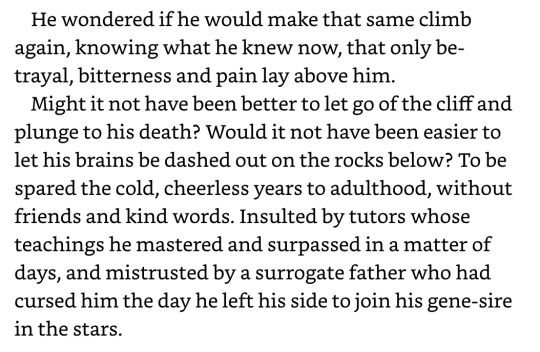
buddy perturabo: maybe i should have just died as a child it would have been a net benefit for literally everyone especially me where do i even start with this

YOU IDIOT, YOURE GOING THE WRONG WAY oh actually fun fact this actually came up recently in a letter from the one substack i follow i don't remember the actual name for this fallacy but it's the "since what i'm doing is HARD that must mean it's the moral/correct choice, right?" "if i'm avoiding everything that could make my life easy, that's the best path"
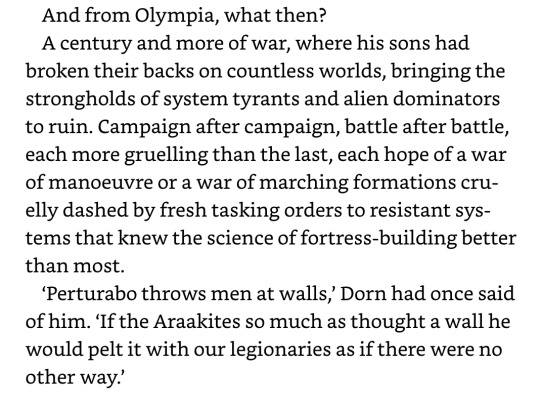
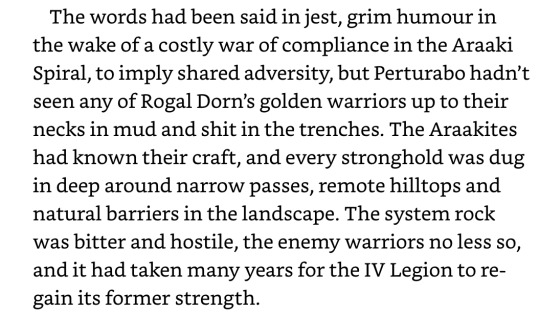
Sky: Maybe the fact that Dorn didn’t engage in bloody trench warfare to the point of wrecking his legion should have been a sign to Pert that he didn’t need to and shouldn’t spend the lives of his sons like water? Bluejay: seee but that would have required actually thinking and changing course which is not something Perturabo knows how to do
"do you get it TRENCH WARFARE REALLY SUCKS" Perturabo's deeply salty that also nowhere in there were the IW commemorated by artists etc the Fists were, though! the one case was er

im laughing out loud for real here
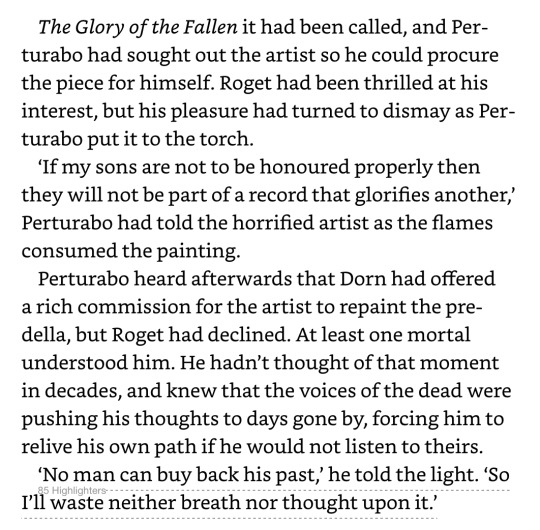
incredible and that last line…
you mean, the past you're constantly haunted by?
perturabo's thoughts: i was heeding the warnings of the dead YOU'RE NOT, YOU DIMWIT
TemplarWarden: The funny thing is, could Fulgrim have escaped if he just abandoned him it's silly multidimensional stuff Bluejay: that's a good question
me about perturabo right now:

im rotating him in a microwave with a fork Perturabo meanwhile is pondering "she who thirsts" because
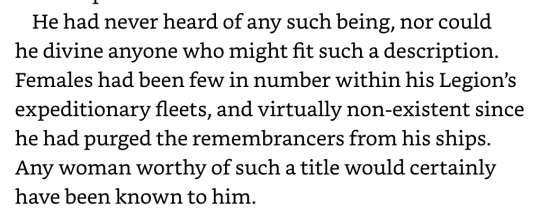
i- you know what, the jokes just write themselves i don't need to say anything is anyone surprised this is the case in the gamer legion Perturabo's reached the bottom though but not rock bottom! it's very pretty
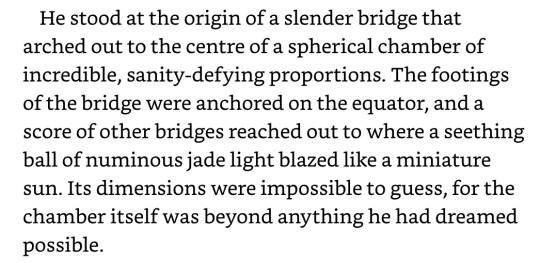
very cool looking in various ways

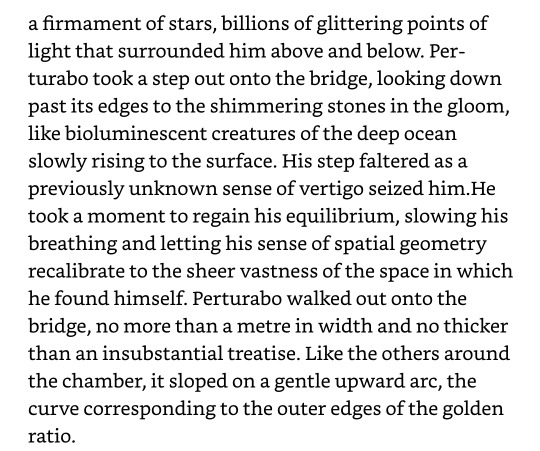
oh yeah
green sun
this came out in 2016 we know McNeill is a weeb but was he also a homestuck? (i'm not saying this as an insult being both a weeb and former homestuck here)
Perturabo finds Fulgrim staring at the green sun
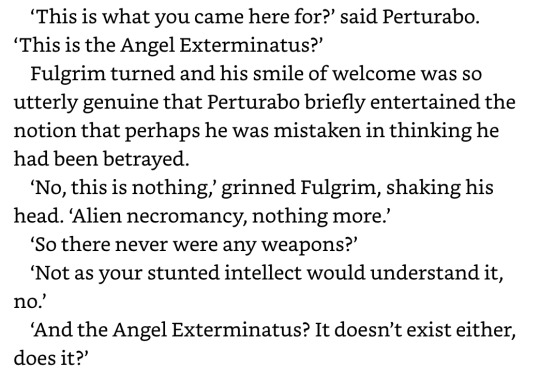
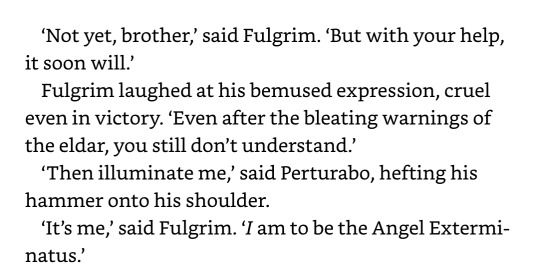
yeah im feeling some homestuck vibes here
i am the x. it is me.
back upstairs, forrix is fighting the ghosts and not doing super well
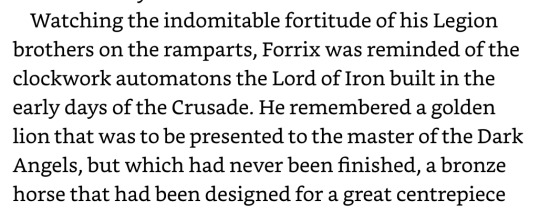
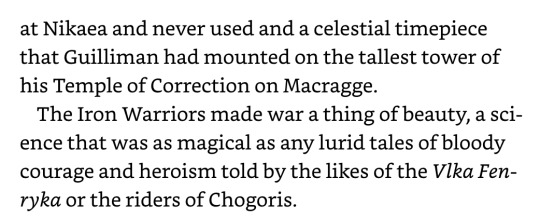
a thing of beauty when we've repeatedly talked about how ugly it is sure, whatever helps you sleep at night and it probably does! they're fighting like a well oiled machine but one that's starting to break down just like this metaphor oh okay, that's kinda cool Forrix tanks a tank
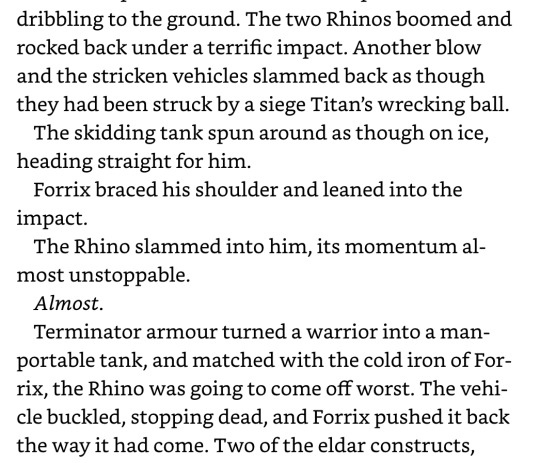
Forrix does almost die to a flamethrower though but Vull Bronn saves him at the last minute and it's time for Toramino to show up! but we're cutting back to the drama underground Fulgrim has started floating that's never a good sign he tells Perturabo that he always lacked vision which is correct

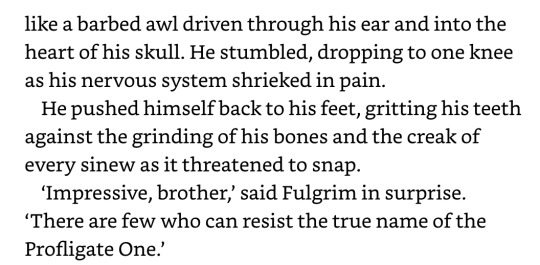
however, his terrible fatigue and weakness are back bro, i feel that

maugetar means harvester, it turns out yes as was foreshadowed, the stone has been draining him of energy this whole time!
Sky:
Perturabo Mightiest of us all
Wut Perturabo is a lot of thing, but the most personally powerful of the Primarchs???
Bluejay: he's got the most life energy that's what he means either that or Fulgrim just. miscalculated. perturabo isn't usually the first one who comes to mind when you think of endurance and internal reserves though yeah Sky: …but life energy in 40K is just either bioelectricity or warp energy Bluejay: of all the 40k rules this book has broken w.r.t. the Eldar, you think it's going to be consistent here? Sky: okay fair
Checkerheart: Fulgrim isn't usually the first one who comes to mind when you think of math skills and logical reasoning Bluejay: hey, fulgrim would like you to know he's smart! he knows what a fibonacci sequence is and everything second response: he's still smarter than perturabo
Sky: I’m just going to assume Fulgrim is lying again because it amuses him, and the real reason is that Pert was just the only Primarch dumb enough to be convinced to make this trip
Why is Fulgrim not using that to mock Pert? IDK, he’s on warp drugs or w/e
TinyGladiator: I could see if Fulgrim literally just doing this to fuck with Perturabo's ego
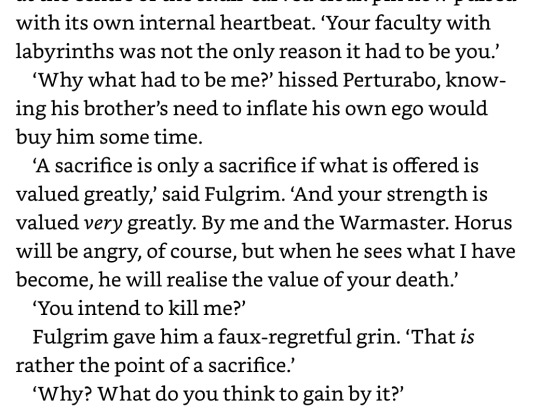
this is funnier because every time Horus thinks about Perturabo in these books he's going "ugh, him"
Sky: Lol imagine if Pert had died here
I don’t think Horus would be personally upset at losing Perturabo but he would definitely be upset at losing a Primarch and a Legion
And cracking Terra without Pert is…not impossible, given how much warp nonsense Sol was drowning in by the end of the Siege, but definitely harder
Bluejay: it's just funny he goes for Perturabo as being valuable because of being important to other people when he's the one that no one really cares about perturabo is also still dealing with the serious fatigue
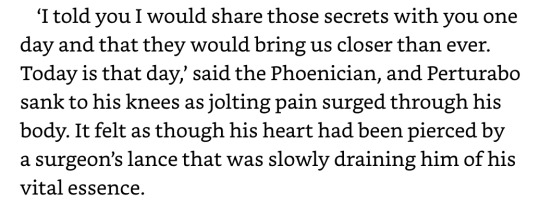
Fulgrim: yeah so i'm not the same person you knew Fulgrim: it allll started with the Laer Fulgrim: turns out the gods they worship are real!
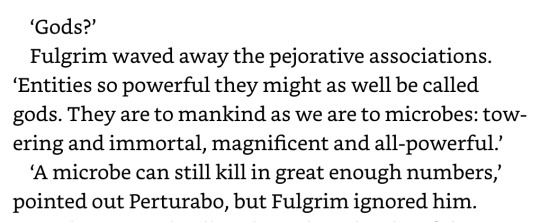
lol lmao also calling a keeper of secrets a god Fulgrim: yeah so i got possessed by one Fulgrim: ew Fulgrim: we eventually learned…compromise
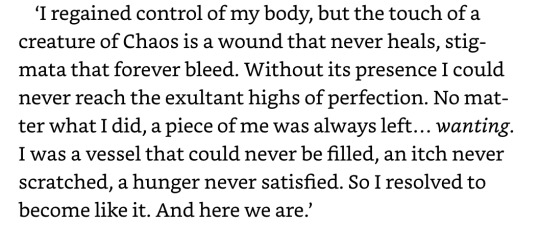
fulgrim is now t-posing in midair and all the soulstones in the walls start flying towards him because that may as well happen with an effort, Perturabo manages to get to his feet, he'd rather die standing up and you know what, if i have suffer this so do you it's not that i think it's badly written per se but it makes my skin crawl
fulgrim, i'm begging you to be a little less weird about this
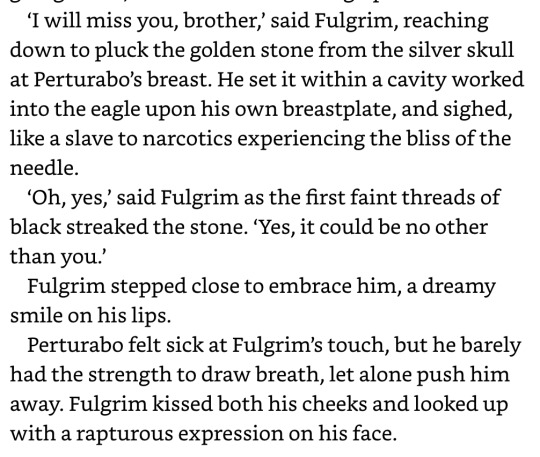
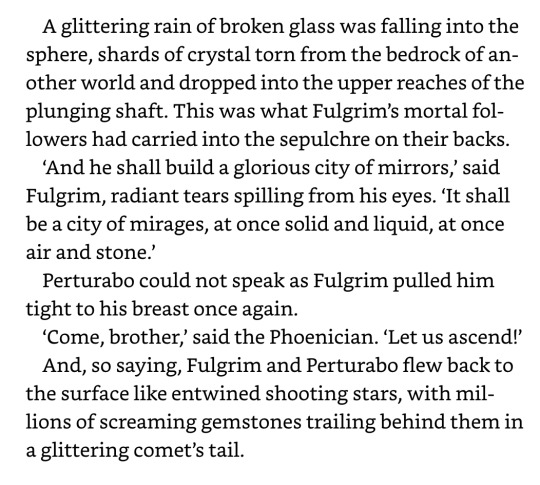
also i'm thinking about "why perturabo, specifically" a) he's dumb enough to fall for this b) he did in fact need him for labyrinth thing c) discount Ferrus
back on the surface, Forrix gets trapped under Perturabo's exploding car at least that's what i think is going on yep juuust as Toramino starts firing at them
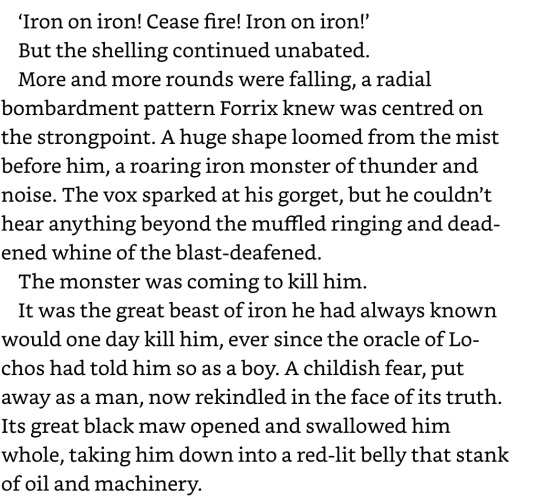

you know, I genuinely thought Forrix died first time around I didn't know he had plot armour next time: some focus on my beloved son going full Khorne, and not one but TWO meme edits. Check out the next Iron Warriors Comedy Hour for more bad jokes and also Fulgrim caressing Perturabo's face before stabbing him. Maybe eventually we'll get to thanksgiving turkey soulstone fulgrim, but that's still a bit of a ways off.
1 note
·
View note
Text
Even though it contains one of the most unmistakably alive and technically impressive of all simulated open-worlds, Red Dead Redemption 2 (RDR2) from the Rockstar Games company is still far more than it appears on the surface. In the game, the player is asked to make choices for Arthur Morgan that prove he or she to be ‘good man’ or a ‘bad man.’ This blog post will briefly outline how RDR2 addresses political, cultural, and social issues, using the open-world structure, honor system mechanics, and narrative to deliver a message that challenges the audience to do introspection that ultimately calls for a reconsideration of how they engage with the world.

RDR2’s gameplay includes a first-person shooter, an honor mechanic, and a simulation. These parts allow for combat, narrative consequence, exploration, and sandbox gameplay respectively. Bogost (2008, p.121) will remind game scholars that rules do not simply allow one to experience play, but they also create the significance of the game overall. Because a player’s gameplay decisions directly influence how the story unfolds, ludic and narrative mechanics are deeply intertwined. They are arguably essential to one another, resulting in a rounded reflection of a player's moral and ethical relation to the world. This idea is particularly applicable to RDR2’s simulation- subjectively, it is as close, visually, as it gets to the real world. The attention to detail, visual richness, and sound all lead to an experience in which it is easy to suspend disbelief. This suspension of disbelief feels as if it heightens the impact of the game’s message. That is not to say that a visually realistic simulation is the only kind of game that is immersive- these things are not mutually exclusive. Beyond the instinctive feeling of awe when playing RDR2 is a broad feeling of empathy and maybe some existentialism. Immersion is a feeling you can get from text, it doesn't have to have anything to do with how something looks or sounds.

“Arthur Morgan: You don’t get to live a bad life and have good things happen to you” (Rockstar Games, 2018).
In RDR2, the combination of ludic and narrative gameplay prompts players to reflect on the tension between their personal values and cold pragmatism. Should a player rob a train for money which could result in innocent deaths? Does the player kill when there is nobody around to witness it? Does the player feel guilt and responsibility hurting people, or do they just take what they want? The game world certainly has a response to ‘bad’ Arthur Morgan. The entire tone of the game shifts if it is being shaped by negative choices. There are too many examples to begin to list, but NPCs will react poorly to Arthur, being unwilling to sell to him, buy from him, or be otherwise friendly. Even Arthur will react poorly to himself, as his dialogue becomes cruel and his appearance changes. There are additional visual and sound indications of low honor, one of which is the deadeye mechanic which changes in color and sound. With violence being an essential aspect of RDR2, the honor mechanic reminds players that while they have freedom in the lawless frontier, they are not free from the consequences of their actions. The player will have to weigh internal satisfaction and restraint against practical advantage and internal and external conflict.

In real life, being a ‘good man’ is not necessarily guaranteed to be rewarded, and it can feel disadvantageous at times. The single apparent advantage to a low honor play-through is material reward. It is understood that the transition from freedom and lawlessness to a regulated and industrialized society is a theme throughout RDR2.
“Arthur Morgan: Who is Leviticus Cornwall?
Hosea Matthews: He’s a big railway magnate, sugar dealer, oil man.
Dutch van der Linde: Well, how good for him. Sounds like he has more than enough to share. (loudly) Gentlemen, it is time to make something of ourselves. Get your horses ready, we have a train to rob” (Rockstar Games, 2018).
While Dutch and the gang make every effort to be one step ahead, the growing pressure of capitalist and corporate control threaten to swallow them whole- Leviticus Cornwall is meant to be an embodiment of capitalism, and this is how RDR2 turns capitalism into one of the greatest antagonists in the game, only behind Dutch and Micah- who are the embodiments of greed and violence respectively. The O'Driscoll's are a kind of nod towards classic western villainy, but it has made clear that Dutch’s gang have more in common with their rival than they would care to admit.
“Arthur Morgan: We’re thieves in a world that don't want us no more” (Rockstar Games, 2018).
Players can feel the squeeze of industrialisation and Capitalism when visiting the city of Saint Denis. NPCs will call out to Arthur, who sticks out like a sore thumb, inquiring if he is lost, teasing him for being a cowboy and for not fitting in.

While RDR2 does not completely escape gender roles, it presents a relatively balanced power distribution between genders. “Most common ways of stereotyping in video games are “damsels in distress” and sexual objectification… In these kinds of games, women are dressed in provocative clothing and are created to serve males as an aid or even as a sexual object. As an example, Grand Theft Auto III Vice City allows the player’s character to have sex with a prostitute, afterwards kill her, and from this act get a health bonus” Kondrat (2015, p.172). Sadie Adler disrupts typical expectations of femininity, being seen as one of the gunslingers without question and represents often more of a threat in combat than the rest of them. An overt sexualisation of female characters in RDR2 is not as blatant as it was in Rockstar’s earlier games. Though Tilly and Abigail still conform to societal expectations of beauty, they are dressed in clothing which respects the period, and they are seen as members of the gang without question.
Stepping into this open world, it may initially seem to be merely providing adventure or exploration- but under the surface, it reflects the game’s designers and their views about the world. In conclusion, RDR2 is a game which explores issues through an open-world simulation, using morality-weighing game mechanics to communicate a message which forces the audiences into introspection about themselves and the world.
Bibliography
Bogost, I., 2008. The rhetoric of video games. In: MacArthur Foundation Digital Media and Learning Initiative, ed. The impact of digital media on learning: Perspectives from the field. pp. 117-140.
Frasca, G., 2013. Simulation versus narrative: Introduction to ludology. In: M. J. P. Wolf and B. Perron, eds. The video game theory reader. Routledge, pp. 221-235.
Kondrat, X., 2015. Gender and video games: How is female gender generally represented in various genres of video games?. Journal of comparative research in anthropology and sociology, 6(01), pp.171-193.
Rockstar Games, 2018. Red Dead Redemption 2. [video game] Available at: https://www.rockstargames.com/reddeadredemption2 [Accessed 1 December 2024].
1 note
·
View note
Text
speech #2
Have you watched Avengers? Doctor Strange in the Multiverse of Madness? WandaVision?
Is Scarlet Witch a hero or a villain?
Let’s talk about it! First things first, Scarlet Witch, or Wanda, is my favorite superhero of all time. I remember playing as her in Ultimate Alliance, and I instantly felt a connection with her. I got to know her more in the animated series X-Men '93, and seeing her in the post-credits of Captain America? I was hyped.
Let me just share a little bit about our girl of the night: Did you know she is actually the daughter of Magneto in the X-Men? Of course not! Marvel Entertainment had licensing rights issues that stripped that history from her, and instead of making her a mutant born with powers, they turned her into a weapon, an experiment.
Most heroes are formed from tragedy. Through terrible loss or internal suffering, their will to protect others manifests as they become their best selves. For some heroes, that part isn’t so straightforward—some, like Wanda, stray from that familiar path.
Wanda lost her parents during the war, which started her trauma and one of her many losses. She wasn’t the same anymore. She then volunteered, along with her twin Pietro, under HYDRA, gaining her chaos magic for revenge. She initially teamed up with Ultron but turned against him when she saw Ultron’s real intentions and chose to team up with the Avengers. Along the way, she lost Pietro, her twin brother, her family, and her only home.
Coping with the loss of her family, and now her twin brother, Wanda experienced disappointment from her friends and team due to differing stances during the Civil War. The event that shattered her heart one last time was when she was given the toughest choice that a fragile, sensitive, and emotional person could face—sacrificing her only love, Vision, to stop Thanos. And for what? Just so the blip could happen? Just so she could see how Stark Industries treated Vision’s body as nothing more than a robot, disassembling him to pieces? What was it all for? Things didn’t get any clearer after the blip, and like many grieving people, she sought escape.
Wanda has the ability to change reality with just a wave of her hand. If you’ve watched WandaVision, she retrieves Vision’s body and creates her own reality in a little town called Westview, manipulating people under her spell to recreate a town based on her favorite 50s show, with Vision alive and well. Her ability to manipulate reality was so powerful that she even conceived twins. At first, it stunned me a bit since biologically, twins skip a generation, but then again, this is the Scarlet Witch we’re talking about—she can make twins if she wants to make twins.
In the Multiverse of Madness, Wanda wouldn’t stop at anything to get what she wanted, revealing her selfishness for the first time throughout the Marvel franchise. If you ask me, I thought she was fucking badass. Her potential, which she had kept in check because she always chose to do the right thing before Vision died, was unleashed. In the end, Wanda redeemed herself by sacrificing herself to stop the chaos magic—the Scarlet Witch.
I’m not going to talk much about the show in detail, but to summarize, it illustrates how someone grieving goes through the stages of denial and bargaining. Honestly, in my view, whether villain or superhero, Wanda is a mutant—an emotional, powerful, and broken one. Knowing her through films and comics, I connect with her. I know what it feels like to care deeply for friends who wouldn’t even nudge or ask how I was doing when it was clear I wasn’t okay at all, to be disappointed by a team that didn’t respect my morals and views. My heart ached knowing that my brother was getting married when we had been long-distance throughout childhood, and now he is leaving me one last time to create his own family. The first boy I actually looked up to and really enjoyed spending time with. I remember crying so hard on his wedding day because I knew he was on another path, and I was on a different one. I know what it feels like to lose someone you love and have no choice but to just let go and let the pain seep in. I know what it feels like to lose a parent slowly and then all at once. All of that pain piling up at once—I can say I’m not a good person because I happened to stray away from the redemption arc of superheroes. Instead of creating something good after such pain, I strayed for a long time. I was angry most of the time, I shut people out, and I did poorly in my work and commitments. I thought to myself, if I ever had the chance to manipulate my own reality—call me selfish and human—I would have snapped my fingers in a heartbeat because, honestly, who wouldn’t?
If I had the chance to meet the Scarlet Witch without her killing me, I would give her a tight hug and say, “It’s okay not to be okay. We’ve all been there sometimes.” I’ve seen how people compare her to Doctor Strange and Spider-Man and how they label her as a villain, but if you think about it, I’ve never seen those two do something good out of grief. It’s just a double standard that I won’t argue about—yet. Call me biased, but if you ask me again, “Is Scarlet Witch a superhero or a villain?” Most people will say she is a villain because she is selfish and just tries to be good. To me, she is a superhero who just strays from the familiar path from time to time but ultimately chooses to be good. In the end, Scarlet Witch is a mutant.
0 notes